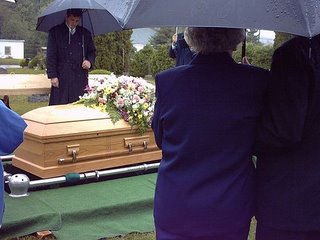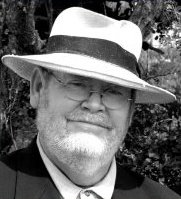While that statement may sound unusual, to me it’s commonplace enough. I’m a minister. That’s what I do.

Yesterday evening, Claire and I went to the funeral home to see Gwen, a member of our church who just lost her husband, Jack, to old age and Alzheimer’s Disease. Robin, our associate pastor, is scheduled to conduct his funeral service, but I felt well enough last evening to go pay my respects, and so I did. It’s a familiar-enough routine: enter the funeral home, greet the funeral directors on the way in (I see a lot of them in my line of work), walk into the room with the open casket over against one wall, and make my way through the crowd of friends and family to find the little cluster of those who are most closely touched by this death.
They don’t teach you in seminary what to say in such situations. I’ve long since learned that what you say isn’t so important anyway. It’s being there. There are heavily symbolic aspects to my role as a pastor, and this is one. When I’m in a room, the church is there too. Some would go further and say that when I’m there, God is there. Although I’d never be so theologically arrogant as to claim that God somehow rides in on my coattails, I’ve become used to the fact that there’s a symbolic aspect to this work. It’s a matter of representation. Just as salespeople out on the road represent their companies, so my presence represents God in times such as this.
 Gwen was glad to see us. We stood with her by the casket and marveled at this wonder of a human body that once had been animate, but now lay cold and still. The face – assisted by the mortician’s skilled labors – was an excellent likeness. Jack had been in declining health, both mentally and physically, for years – but last night there was no sign of it. He looked like himself, as we all remembered him from better days. To Gwen, who had been so devoted to him, that was a blessing beyond words.
Gwen was glad to see us. We stood with her by the casket and marveled at this wonder of a human body that once had been animate, but now lay cold and still. The face – assisted by the mortician’s skilled labors – was an excellent likeness. Jack had been in declining health, both mentally and physically, for years – but last night there was no sign of it. He looked like himself, as we all remembered him from better days. To Gwen, who had been so devoted to him, that was a blessing beyond words.This morning I meet for an hour or so with David and Lauren, who have just lost their wife and mother, Madeline, to ovarian cancer. She was in her fifties – too young, anyone would agree. I’m planning to conduct her memorial service in a few weeks (which we think we’ve timed right, in between my chemo treatments). We sit, the three of us, in my study at the church, mostly sharing stories. I’ve found that’s the most helpful thing to do in such a situation. The stories somehow conjure the person in our minds, so we can – when the time is right – say farewell.
Dave and Lauren had ample opportunity to say farewell to Madeline. With the slow progression of her disease, they knew she was dying. So did she. She talked about it freely. My last conversation with her was on the phone, at a time when I was too sick to leave the house (though Robin went over the next day and brought her communion). In the end, it was only a matter of time, until the family dared whisper the wish that finally comes to so many hospice rooms, the wish that it would soon be over.
 As hard as it may be for those who have not lived through this kind of protracted bereavement to understand, this can be the most loving wish imaginable. The family have been journeying with their loved one through the sort of reverse pregnancy that is dying, and they’ve come to the point where they wish this new reality would be born: this new life that we believe begins at the instant of death, but whose details we cannot imagine until we ourselves experience it. When a baby is born, the pre-birth existence in the womb remains a dark mystery. Similarly, when a person dies, the life that awaits beyond this one is swathed in mystery. We stand, as family and friends and church, at the edge of that sweet but mysterious darkness, and our job is let go, to release the grip on the hand, to say it’s OK, you can go, it’s all right, we’ll all be all right.
As hard as it may be for those who have not lived through this kind of protracted bereavement to understand, this can be the most loving wish imaginable. The family have been journeying with their loved one through the sort of reverse pregnancy that is dying, and they’ve come to the point where they wish this new reality would be born: this new life that we believe begins at the instant of death, but whose details we cannot imagine until we ourselves experience it. When a baby is born, the pre-birth existence in the womb remains a dark mystery. Similarly, when a person dies, the life that awaits beyond this one is swathed in mystery. We stand, as family and friends and church, at the edge of that sweet but mysterious darkness, and our job is let go, to release the grip on the hand, to say it’s OK, you can go, it’s all right, we’ll all be all right.When that fierce intimacy is ended, I come in, and help everyone sort out what has just happened. I ask questions, I listen to stories, I hand over the kleenex box, I write down those things that will become part of the funeral service. Again, my role is largely symbolic. The family has not come to see me; they have come hoping to see God. They yearn to be assured that God was there, too, in that sickroom, and they yearn to be assured God is with them still, as they prepare for one of life’s most difficult roles, that of bereavement. There’s not much more I really have to do than that – just be there, listen, let them talk as they have the need, and hope that my presence somehow speaks to them of God’s far more significant presence.
If truth be told, I feel like a pretty poor stand-in for God much of the time (and I know most of my ministerial colleagues feel the same way). But it’s not about us. It’s about God, and the fact that God somehow uses this frail human institution called the church, and its even frailer representatives called ministers, to remind people how much they are loved.
Poet and undertaker Thomas Lynch reflects on people like me, and what we do:
"Uncles find nickels behind our ears. Magicians pull rabbits from out of hats. Any good talker can preach pie in the sky or break out the warm fuzzies when the time is right. But only by faith do the dead arise and walk among us or speak to us in our soul's dark nights.
 So rabbi and preacher, pooh-bah and high priest do well to understand the deadly pretext of their vocation. But for our mortality there'd be no need for churches, mosques, temples, or synagogues. Those clerics who regard funerals as so much fuss and bother, a waste of time better spent in prayer, a waste of money better spent on stained glass or bell towers, should not wonder for whom the bell tolls. They may have heard the call but they've missed the point. The afterlife begins to make the most sense after life – when someone we love is dead on the premises. The bon vivant abob in his hot tub needs heaven like another belly button. Faith is for the heartbroken, the embittered, the doubting, and the dead. And funerals are the venues at which such folks gather.” (Thomas Lynch, The Undertaking, Penguin, 1997, pp. 80-81.)
So rabbi and preacher, pooh-bah and high priest do well to understand the deadly pretext of their vocation. But for our mortality there'd be no need for churches, mosques, temples, or synagogues. Those clerics who regard funerals as so much fuss and bother, a waste of time better spent in prayer, a waste of money better spent on stained glass or bell towers, should not wonder for whom the bell tolls. They may have heard the call but they've missed the point. The afterlife begins to make the most sense after life – when someone we love is dead on the premises. The bon vivant abob in his hot tub needs heaven like another belly button. Faith is for the heartbroken, the embittered, the doubting, and the dead. And funerals are the venues at which such folks gather.” (Thomas Lynch, The Undertaking, Penguin, 1997, pp. 80-81.)After more than twenty years of doing this, I think I do understand what Lynch calls “the deadly pretext of my vocation.” I’m learning that the fact that I have a disease that could kill me doesn’t make a bit of difference. We’re all going to die. Some do it sooner than others, but eternity has the same duration, regardless. While I have breath, I continue to feel privileged to be welcomed into that intimate place where family members confront their deepest griefs and fears, hold tight to one another for comfort – and look for God to show up, somehow, just beyond their peripheral vision... as I walk into a room, bald head and all.
2 comments:
Just brilliant. You had me in tears at my desk...again. Thanks for everything. And have a great day. MB
I agree with mary beth...just wonderful and much appreciated having lost my husband not too long ago.
thank you. You are very eloquent and it is a privilege to read your words.
Rosemarie
Post a Comment